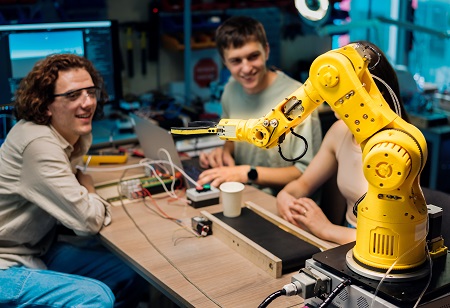
Manufacturing's Collaboration and Innovation Hubs help spark fresh ideas, speed up the creation of products, and increase overall workflow speed. More companies are looking for collaborative setups. They gather wide ranging talents, thoughts, and resources to boost crossbeam cooperation and speed up innovation; more makers turn to these hubs.
There's a big push from businesses to start or join these hubs. They see the opportunity for tech and process improvements. The hubs are more than just a workplace; they're a source of new ideas where businesses, upcoming companies, and scholars unite. This team-up does more than speed up new product creation. It also tackles industry troubles by working together to find solutions. The Collaboration and Innovation Hubs' manufacturing market is ready for growth. Companies view these hubs as vital. They fuel competitiveness in the fast-changing world of Manufacturing.
“India is becoming increasingly important for the $19-billion health technology company as an innovation and manufacturing hub, and as a market” says Roy Jakobs, CEO of Royal Philips.
Cross-Industry Collaboration: Breaking Silos for Synergy
Success in Collaboration and Innovation Hubs for production rides on fostering crossindustry partnerships. Manufacturing usually stayed in its lane, with different sectors barely mixing. The hubs are impartial spots where companies from varied sectors gather, exchange ideas, and work together on projects that ripple through thewhole manufacturing scene.
In the United Kingdom, the Advanced Manufacturing Research Consortium (AMRC) is an excellent case of a hub sparking interindustry innovation. AMRC gathers manufacturers, engineers, and researchers from different sectors like aero, auto, and healthcare. Working together on projects like developing new lightweight materials and hightech robotics, they all benefit from shared knowledge and resources, speeding up innovation in multiple sectors.
Open Innovation Platforms: Accelerating Knowledge Exchange
Innovation Hubs are open platforms for idea exchange. Companies can freely share thoughts, tech, and knowhow here. Open innovation has gained traction in business practices. Companies use external wisdom to boost inhouse invention processes. Hubs facilitate a smooth flow of details, giving manufacturers more comprehensive access to expertise and resources beyond what they could get within their companies.
In Germany, FraunhoferGesellschaft operates research centers and institutes. These act as open innovation hubs for different industries, like manufacturing. These centers partner with businesses, academia, and government institutions, promoting a vibrant exchange of ideas. Fraunhofer aids in the movement of knowledge from studies to practical use. They do this by supporting companies with projects like collaborative research and tech transfer programs. These efforts assist businesses in bringing advanced manufacturing methods to life.
Technology Integration and Skill Development: Nurturing the Workforce of the Future
Changes in the manufacturing field are happening fast due to new tech. This makes a flexible, well learned team more vital than ever. Think of Innovation Hubs as bridges. They mix new tech and workforce training. This gives workers the chance to grow with Handson experience and learn new stuff related to the newest tech. This way, they can handle the tricky stuff in modern manufacturing better.
One good place that does all this is the Advanced Manufacturing Training Center (AMTC) in Singapore. AMTC works alongside companies to create training programs that match what the manufacturing field needs as it changes. Whether digital manufacturing or augmented reality, the AMTC prepares the workforce. This gets workers ready to roll with the punches and bring new ideas to a techforward manufacturing scene.
Think of Collaboration and Innovation Hubs as super focused meeting places. They're sparking massive changes in how we make things. They get people from different industries talking, sharing ideas faster, and helping younger workers learn the ropes. As tech gets more woven into how we manufacture, these hubs give businesses a clear path forward. They help them stay flexible, creative, and one step ahead in the world market. Realworld stories back up just how much these hubs can change things up. They show theshift in manufacturing to a place were working together rules. As this shift keeps ongoing, you can't underestimate the vital role these Hubs play in shaping how we'll make things in the future.

